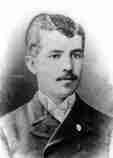Enrique Tornú
Enrique Tornú (1858-1901) was an influential Argentine physician and public health advocate, renowned for his contributions to the medical field in Argentina during the late 19th and early 20th centuries. His work significantly impacted the development of public health policies and the establishment of sanitary conditions in urban and rural areas of Argentina.
Early Life and Education[edit | edit source]
Enrique Tornú was born in Buenos Aires, Argentina, in 1858. From a young age, he showed a keen interest in the medical sciences, which led him to pursue a career in medicine. Tornú enrolled in the University of Buenos Aires, where he excelled in his studies and graduated with a degree in medicine. His early career was marked by a strong commitment to improving public health and sanitary conditions, which were major issues in Argentina at the time.
Career[edit | edit source]
After completing his education, Tornú dedicated himself to the field of public health. He was particularly concerned with the spread of infectious diseases, which were rampant in Argentina due to poor sanitary conditions. Tornú advocated for the implementation of modern sanitation practices, including the construction of sewage systems and the provision of clean drinking water. His efforts were instrumental in the establishment of Argentina's first public health policies.
Tornú's work extended beyond public health advocacy. He was also involved in medical education, teaching at the University of Buenos Aires and contributing to the development of the medical curriculum. His teachings emphasized the importance of preventive medicine and public health, subjects that were relatively new to the medical community in Argentina at the time.
In addition to his teaching and advocacy, Tornú made significant contributions to medical research. He conducted studies on various infectious diseases, including tuberculosis and yellow fever, which were major health concerns in Argentina. His research helped to improve the understanding of these diseases and contributed to the development of more effective treatment and prevention strategies.
Legacy[edit | edit source]
Enrique Tornú's legacy is evident in the continued importance of public health in Argentina. He is remembered as a pioneer in the field, whose work laid the foundation for modern public health practices in the country. In honor of his contributions, several institutions and facilities have been named after him, including the Enrique Tornú Hospital, a leading public health facility in Buenos Aires.
Tornú's dedication to improving the health and well-being of the Argentine population has left a lasting impact on the country's medical field. His work serves as an inspiration to future generations of physicians and public health professionals in Argentina and beyond.
Death[edit | edit source]
Enrique Tornú passed away in 1901, but his legacy lives on through the continued efforts to improve public health in Argentina. His vision for a healthier society, grounded in the principles of preventive medicine and public sanitation, remains a guiding force in the country's public health policies.
Search WikiMD
Ad.Tired of being Overweight? Try W8MD's physician weight loss program.
Semaglutide (Ozempic / Wegovy and Tirzepatide (Mounjaro / Zepbound) available.
Advertise on WikiMD
|
WikiMD's Wellness Encyclopedia |
| Let Food Be Thy Medicine Medicine Thy Food - Hippocrates |
Translate this page: - East Asian
中文,
日本,
한국어,
South Asian
हिन्दी,
தமிழ்,
తెలుగు,
Urdu,
ಕನ್ನಡ,
Southeast Asian
Indonesian,
Vietnamese,
Thai,
မြန်မာဘာသာ,
বাংলা
European
español,
Deutsch,
français,
Greek,
português do Brasil,
polski,
română,
русский,
Nederlands,
norsk,
svenska,
suomi,
Italian
Middle Eastern & African
عربى,
Turkish,
Persian,
Hebrew,
Afrikaans,
isiZulu,
Kiswahili,
Other
Bulgarian,
Hungarian,
Czech,
Swedish,
മലയാളം,
मराठी,
ਪੰਜਾਬੀ,
ગુજરાતી,
Portuguese,
Ukrainian
Medical Disclaimer: WikiMD is not a substitute for professional medical advice. The information on WikiMD is provided as an information resource only, may be incorrect, outdated or misleading, and is not to be used or relied on for any diagnostic or treatment purposes. Please consult your health care provider before making any healthcare decisions or for guidance about a specific medical condition. WikiMD expressly disclaims responsibility, and shall have no liability, for any damages, loss, injury, or liability whatsoever suffered as a result of your reliance on the information contained in this site. By visiting this site you agree to the foregoing terms and conditions, which may from time to time be changed or supplemented by WikiMD. If you do not agree to the foregoing terms and conditions, you should not enter or use this site. See full disclaimer.
Credits:Most images are courtesy of Wikimedia commons, and templates Wikipedia, licensed under CC BY SA or similar.
Contributors: Prab R. Tumpati, MD

